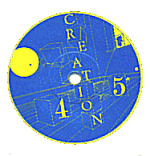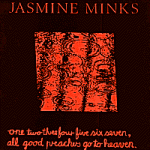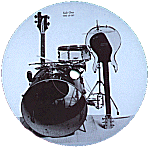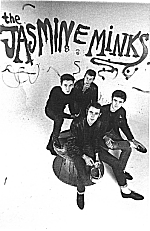 | |
 | Me and Alan McGee
One of the possessions I used to prize most was a letter. Its writer was Alan McGee, the founder of Creation Records and an inspiration to many if not all of the bands - Primal Scream, the Jesus and Mary Chain, and, most unfortunately, Oasis - he has signed over the years. Alan had been kind enough to respond to my fanzine, in which I wrote enthusiastically about his own group, Biff Bang Pow! and their 1987 album Oblivion. I mention this only because it's indicative of how different Creation were from most other record labels. McGee had been a fanzine writer himself, putting out the first issue of 'Communication Blur' in 1983. That same year he founded Creation Records and began running a club called the Living Room (ring any bells, Tangents fans?) where bands like the June Brides and the Jasmine Minks, bred on a diet of '60s garage, '70s punk and '80s indie, would play to an audience predominantly composed of members of other groups and their friends. Music was everything to the habituÄs of the Living Room, and McGee speaks for many when he says of himself, 'I was this invisible, freckly, red-haired creature, so music was my escape into another world'. Like Postcard, Factory and Sarah Records, Creation inspired a sense of loyalty and belonging in its fans comparable with the ownership that football supporters feel for their team. That's untypical in the hype-ridden, celebrity-driven world of the music business, where both major and independent companies are faceless organisations lacking in purpose and imagination. It meant that you were always prepared to listen to every release, no matter who it was by. Records by the Pastels and the Loft would be sent out to journalists and record shops with ranting press releases which said, 'If you don't like this, we don't like you, you bastards!' You didn't always like them - it would be unusual to like every group favoured with a Creation contract - but such conviction meant that each release was eagerly awaited, in case it was the next Greatest Record Ever Made. |
 | Do you need direction? - You know I do...
My own Creation favourites were the Jasmine Minks. Based on the songwriting axis of Adam Sanderson and Jim Shepherd, their best moments - the mini-LP 1234567 All Good Preachers Go To Heaven, the singles 'What's Happening' and 'Cold Heart' - hail from the time before a disillusioned Sanderson left, while their most consistent LPs are the last two, featuring Shepherd's songs alone. The third LP ever released by Creation, Preachers' six slices of crystal-clear pop caught the group at the height of their enthusiasm, and brimful of attitude. It still sounds more affectingly alive than, oh, just about anything released in the '90s. By the time of their penultimate album Another Age in 1988, Sanderson had left, and it was down to Jim Shepherd to lead rousing clarion calls like 'Cut Me Deep', which was typical in being propelled upwards and onwards by the same old jagged guitar against the backdrop of a heavier all-round sound. There were also fragile but mature ballads on which Jim Shepherd faced up to the despondent situation he saw both in his own musical future and in the country at large. The Jasmines were defeated by disinterest, or by the unchallenging interest only of those already converted. Listening back, the transition from optimism through fiery pessimism to the absolute knowledge that it wasn't going to happen is plain. In 'Living Out Your Dreams', Shepherd sang about the departed Sanderson: 'will your pen which wrote such fire ever grace the page again?' On Scratch The Surface, as timeless and unfashionable a record as ever was made, the resignation is recognisable alongside the ache in his voice. He was singing for all the future records the Jasmines guessed they would never make. The last time I saw Jim Shepherd was through the window of a Moorgate coffee shop I was passing. We held each other's glance for a split second, and then he looked away. The early Creation releases came in the choice 7" vinyl format that will in years to come lead to folks of my age being ridiculed in much the same way as old-timers who used to go on about 78s. But what band of the shellac age released a string of pearl-like singles as exciting as the Jasmines, from the yearning refrain of 'Where The Traffic Goes' to the life-affirming garage roar of 'What's Happening'? 'Pop is about singles, solitary songs, complete statements. It always has been, and it always will be.' Kevin Pearce wrote that about the Jam, but equally it was informed by the early Creation 45s, with their suitably distinctive labels - a pile of children's building bricks on one side toppled by a bouncing ball on the other. (It's been a pleasure recently to see Cornershop singing the praises of the 45; the 99p 7" of 'Brimful of Asha' was of course the only conceivable format to go for.) Of other Creation groups who lived up to Kevin's maxim, the Bodines released the shimmering 'Therese', then, like so many Creation groups, signed to a major and were lost from view. It was all about trust. And it helped that McGee was a songwriter himself. Biff Bang Pow! mixed lovelorn fervour and unrepentant optimism on albums such as Songs For The Sad-eyed Girl and The Girl Who Runs The Beat Hotel. McGee's principles and his belief in redemptive possibilities of pop music shone through. 'There's no love in this town except for me,' he once sang, levelling a typical accusation against the soullessness of 1980s Britain. It was this attitude that led to Creation being the proud home for pop mavericks like Momus and Felt when in all probability no-one else would have them. |
 | Why guitar pop sucks in '98
In the early '90s, Creation lost its sense of direction, inevitably coinciding with the well-documented drink and drug excesses that McGee's life had been undergoing. (A now sober McGee says, 'Real rock'n'roll is about spirit and energy and celebration. All the baggage that goes with it is just that: baggage.') With the honourable exception of Primal Scream's Screamadelica in 1991, Creation had by and large missed out on the marriage of dance beats and guitar attitude that centred on Manchester's Factory label, offering instead the ethereal and typically indie sound of Slowdive and Ride. (In 1996, Creation made up for their mistake by re-releasing 6 albums by Factory mainstays A Certain Ratio, whose crazy rhythms and dark chords were the inspiration for the Happy Mondays.) In 1992, with debts approaching ú1.5 million, McGee sold 49% of Creation's share to the Sony Corporation. Only the chance signing of Oasis the following year restored the fortunes of a label that would otherwise have lost its founding father, and with him, its raison d'Étre. McGee sums up how things have changed since the early days of Creation: 'Back then, it was about being different; now it's about being the biggest and the best.' If he wasn't so infuriatingly proud of Oasis, you might get Alan McGee to admit that units shifted is no sign of class, and that small can be beautiful. So has he sold out to the rock beast he used to fight against? Well, understanding that nothing lasts forever, that passionate people grow older, mellower, move on from the energetic beliefs of their youth - yes. It's worrying that no-one acknowledges the ethic and the music that Creation was built on, least of all the label itself. The official Creation website (http://www.creation.co.uk/) is mysteriously uninformative about its early and even its middle years. Groups like the Jasmine Minks and the Bodines were easily more exciting and defiant than Oasis; that they lacked the arrogance and the eyebrows of the Gallagher brothers is in my opinion no bad thing. Oasis are one of the least threatening groups ever to record for Creation. Simple and comfortable, you know where their chords are going, and it would be a disappointment if they didn't end up there. I still find it surprising that more vitriol isn't spat Oasis' way - there's more to music (and life) than a couple of anthems you can whistle and a singer who makes a virtue out of not giving a fuck. As for the Jasminks, hopefully the official book about Creation Records, scheduled to appear next year, will furnish them with at least some of the respect they deserve. While the Creation roster currently contains far too many mediocre groups (Three Colours Red and Hurricane No. 1 are particularly insipid: the use of a track by the latter in a Sun newspaper advertising campaign says it all), they also have a joker in the pack. The Super Furry Animals have eased past the erratic Gorky's Zygotic Mynci as Wales' finest. Gruff Rhys, the singer, wrote his first song when he was five. Born to it, you might say. Along with Gorky's, the Super Furries typify the effect of living in Wales on pop music: it comes out odd, a little kooky, shot through with a sense of distance from the rest of Britain and London especially. That was always the refreshing thing in the music coming out of New Zealand in the 1980s - the Verlaines and the Chills, whose Kaleidoscope World retrospective was released by Creation in 1986, were equally unique, equally untainted by hype and scenes . |
 | Clarity just confuses me
After two releases on the Welsh independent Angst (where Gorky's also began life), Super Furry Animals released their first album on Creation in 1996. Fuzzy Logic was a trawl through the depths of singer Gruff Rhys' mind, which revealed, among other things, a preoccupation with hamsters, extra-terrestrial experiences and atheism. Songs like 'Hometown Unicorn' and 'God! Show Me Magic' combined the exuberance of the Undertones with the musicality of the Beach Boys, to pick two random shades you'll hear in their fuzzy pop, while the stately melodies of 'If You Don't Want Me To Destroy You', a song about what a drag gravity is, were as near to perfection as pop gets. The group rightly protest when they are labelled as Welsh loonies; it's very easy to lump the few Welsh groups that there are together, and humour is an ingredient largely absent from pop music, so lazy journalists are surprised into calling bands as mad as a hatter when they do come across it. Admittedly the boys haven't helped their cause by antics such as taking a military tank on tour with them, and singing about Mexican vampire bats which attack goats, but there is also a seriousness and a melancholia underneath their urgently creative imaginations. And the Super Furry Animals are as audibly Welsh as Blur are English - you can easily hear Gruff's accent when he wraps his vocal chords around his testingly tuneful melodies, even when they're not actually using the language of their forebears. Last year saw the release of the Furries' second album. Radiator was as spontaneous as Fuzzy Logic but more elaborate; musically they had become as diverse as Gruff's subject matter. The usual melodic assault battles with hissing distortion on 'Hermann Loves Pauline', the song title being a typically idiosyncratic reference to Einstein's parents, while the epic 'Mountain People' is a gentle tribute to the people of the more remote parts of Wales. That's the Super Furry Animals: on the surface, a mass of trivia and jokey playfulness, and at the core, a firm political conscience. It was no surprise to see Gruff pop up on 'Newsnight' to speak in favour of Welsh devolution from the rest of Britain. Later this year an album of B sides and an EP of new material will be released by Creation. Part of the Furries mission statement is to provide quality recordings along with their A sides, so come the time, give the album a spin, especially as the inclusion of live favourite, 'The Man Don't Give A Fuck', previously only available as a limited edition single, is promised. Meanwhile, Radiator and Fuzzy Logic are waiting for you. |
 | Didn't you play in a group once, a long time ago?
Rumour has it that Jim Shepherd is thinking of staging a return to recording and performing. There are very few people I would like to see come out of pop retirement - the danger is always that an old hero will besmirch their reputation - but Jim Shepherd is one of them. And Alan McGee? I have to confess I still prize that letter. He has a way to go before he's Richard Branson, although these days he is invited to parties at 10 Downing Street, sits on the Department for Culture, Media and Sport's Music Industry Forum, and better than this, pens laudably forthright articles on the legalisation of drugs for the Guardian (The Week, 14/3/98). Not bad for a freckly former fanzine editor and railway clerk. He'll never again be as passionate about music as he was in the days of Biff Bang Pow!, and I wonder if he can still communicate what pop music means to the up and coming generations of young Britons from such a comfortable position, but without Alan McGee, the 1980s would have been an even sorrier time.
|
 | Seven days of Creation
Monday: Pass The Paintbrush Honey Biff Bang Pow! Seven more days of Creation
Monday: Oblivion Biff Bang Pow!
|